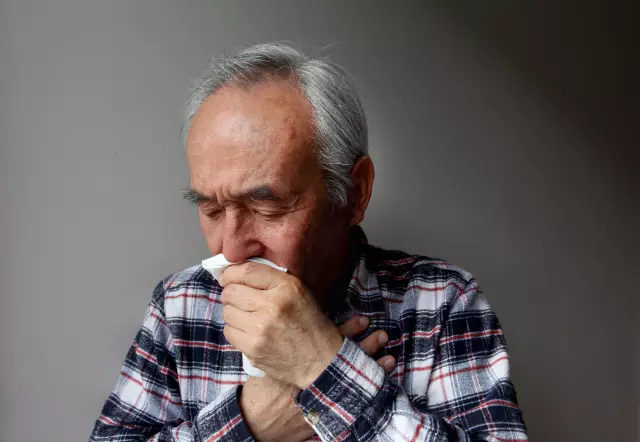- Author Rachel Wainwright [email protected].
- Public 2023-12-15 07:39.
- Last modified 2025-11-02 20:14.
Withdrawal symptoms

The painful state of abstinence develops after stopping the intake of psychoactive substances and indicates the formation of addiction. When withdrawal symptoms are noted, the patient has an alcoholism disease. It depends on many factors, such as:
- Duration of alcohol abuse;
- Hereditary predisposition;
- The age at which a person begins to get involved in alcohol;
- Baseline health.
A person who daily takes insignificant doses of alcohol "for health", one way or another, gets addicted to alcohol. A large amount of alcohol taken once, contributes to the early formation of alcoholism.
The passion for alcohol is not inherited, but there is a predisposition in a child in a family of alcoholics. As a rule, withdrawal symptoms in such children develop in the near future. Sometimes less than one year of "experience" is enough.
Early exposure to alcohol contributes to the development of alcohol dependence. With a certain heredity, even a late hobby, after 30-40 years, almost instantly transforms a hangover into an abstinence syndrome, which indicates alcoholism.
Health status, including hereditary characteristics, affects the development of alcoholism. People born in the North do not have a reserve of the enzyme that processes ethyl alcohol. The whole internal struggle with alcohol in such people is limited by the work of hepatic alcohol dehydrogenase. While in southerners about 30% of alcohol is processed by muscle tissue. The liver and brain are affected less. Consequently, withdrawal symptoms in southern people develop much later. The northern peoples include not only the Chukchi and Aleuts, but also the Russians. Therefore, the Slavs are also at risk for the development of alcoholism.
Alcohol withdrawal syndrome
There are clear criteria for the onset of alcoholism. First of all, the gag reflex to an excess of drunk alcohol disappears. The body takes it for granted and does not try to resist excessive "infusion". Vomiting returns after a while, but it is not related to alcohol intake. On the contrary, alcohol withdrawal syndrome provokes the gag reflex as a manifestation of intoxication.
A person's hangover condition goes away by lunch the next day, while withdrawal symptoms begin in the late afternoon. That is, the patient feels bad in the morning, and even worse in the evening.
Subsequently, the pathological condition is delayed for several days. Drinking alcohol leads to an apparent improvement in health. After some time, the alcoholic's condition only worsens.
Withdrawal symptoms, symptoms
The state of withdrawal is characterized by damage to the nervous system. The myelin sheaths of the nervous tissue are dissolved by the decay products of ethyl alcohol, and the nerve transmission slows down tens of times. Outwardly, it looks like lethargy, memory disorders, a low threshold of sensitive nerve fibers. The developed withdrawal syndrome, symptoms are not only neurological, but also concerning all organs and systems, which are innervated by myelin nerve fibers.
Analyzers are the first to suffer. Under normal conditions, insignificant noise can infuriate a patient who is in deep abstinence.
At the level of higher nervous activity, damage to nerve fibers leads to true hallucinations. Patients see frightening pictures with the participation of small monsters and "green devils". The feeling of fear constantly accompanies a person who develops withdrawal symptoms, while the patient is unable to explain why he is so scared to cross the street, bridge over the river and other minor obstacles.
Liver damage leads to the development of chronic hepatitis, with a tendency to transition to portal cirrhosis. In this case, not only the digestive system suffers, but also the hematopoietic system. And only the removal of withdrawal symptoms prevents death. Otherwise, cerebral edema develops, which leads to the shutdown of the centers of respiration and blood circulation.
Treatment of withdrawal symptoms
A state of withdrawal is a pathology that requires immediate medical attention. In narcology, the removal of withdrawal symptoms is the primary task of emergency care. The patient must be hospitalized. He undergoes intensive therapy aimed at relieving intoxication syndrome. The decay products of ethyl alcohol, which affect the nervous system, are forcedly excreted from the body.

In addition to infusion of electrolyte solutions, the patient is prescribed sedatives, hypnotics, vasodilators. In severe cases, resuscitation measures are carried out if necessary. Of course, the treatment of withdrawal symptoms is carried out only by specialists in the drug treatment center. It is difficult to get rid of withdrawal symptoms at home. Even a self-passed state of alcoholic delirium does not guarantee a complete cure.
Withdrawal symptoms are prone to relapse, so the patient needs to stop drinking. Each repeated emergency condition leads to another irreversible shift of higher nervous activity. Repeated attacks of abstinence contribute to alcoholic degradation of the personality.
Withdrawal symptoms, prevention
To avoid the unpleasant consequences associated with alcohol, it is necessary after the first hangover to stop drinking alcohol for at least three weeks. This is exactly how much it takes to restore the myelin fibers of the nervous system. Repeated "libation" aggravates the primary defeat and promotes the development of abstinence, which accurately indicates the formation of alcoholism.
YouTube video related to the article:
The information is generalized and provided for informational purposes only. At the first sign of illness, see your doctor. Self-medication is hazardous to health!






